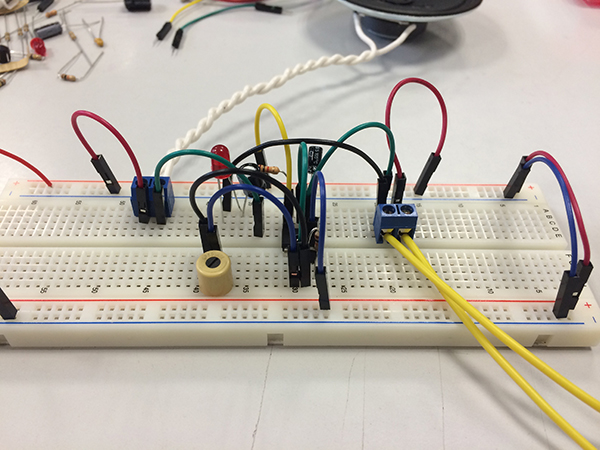| Line 26: | Line 26: | ||
== Living Walls/Final project == | == Living Walls/Final project == | ||
'''If you cannot see the video, please go to this link:''' [https://www.youtube.com/watch?v=V5pU1krz878] | |||
<videoflash>V5pU1krz878|640|400</videoflash> | |||
Revision as of 14:19, 16 February 2016
Improbable Switch / Assignment 1
For this assignment I began by testing conductive materials that would allow me to create an improbable switch. My first approach was a key that would trigger sound and light when inserted into a lock. After tests and fixes... It worked!!! :)
Later on I got curious about the possibility to create a device that could be set in different places, so it would have the ability to be placed between objects, under, above, etc, allowing some flexibility in this respect, so the surrounding setting could be changed as needed.
I came up with a "pressure switch" that would turn itself off whenever pressure was released, and on otherwise. A flexible structure that would return to its original shape seemed to be a good solution (thus facilitating the closing and opening of the circuit). I was able to achieve my goal by using a sponge, wires, cardboard, tape, and aluminum foil. (see the video below)
If you can see the video, please go to this link: [1]
<videoflash>higlHq2AbrM|640|400</videoflash>
Experimental Resistance/Assignment 2
For this assignment I wanted to continue experimenting with sound. I got excited when I found out that different pitches could be produced by a variation on the resistance.
At this point my goal became to build a system capable of producing a wide range of sounds. I used different substances and combinations of them that would result on a variation of the amount of ions in a given solution, and therefore its conductivity. I wired the whole structure with wire and conductive material to connect all the substances and surfaces, by doing so I increased the sound possibilities based on the random combinations that could take place.
This experimental resistance became a "solutions chain" located in the middle of a circuit where it became possible to select where the conductive props would be placed (to close the circuit), thus producing a different outcome depending on the combination.
If you cannot see the video, please go to this link: [2]
<videoflash>GOPm6yR4RG4|640|400</videoflash>
Living Walls/Final project
If you cannot see the video, please go to this link: [3]
<videoflash>V5pU1krz878|640|400</videoflash>
